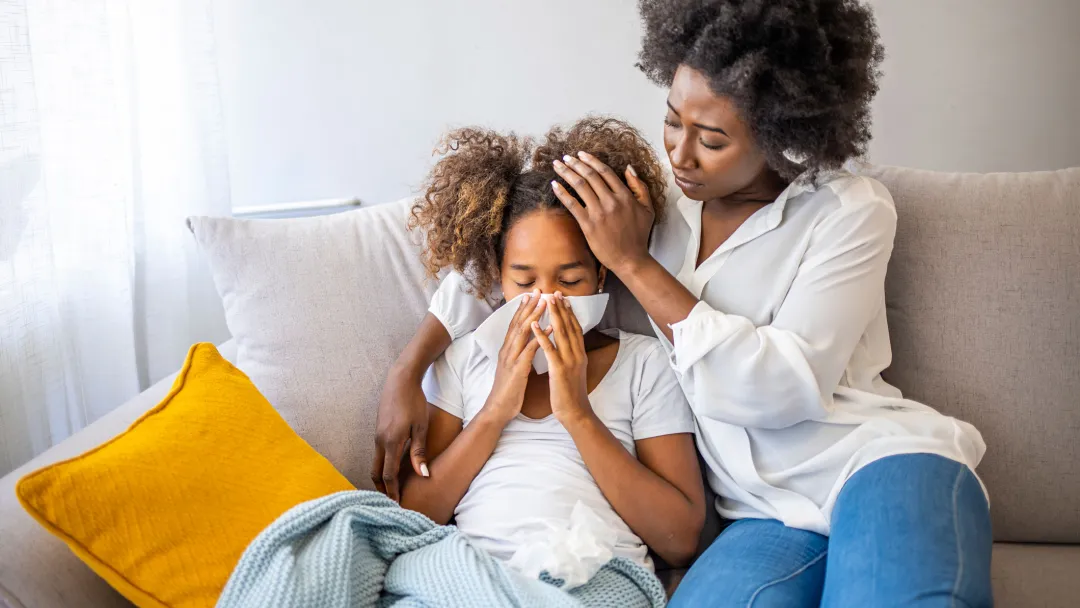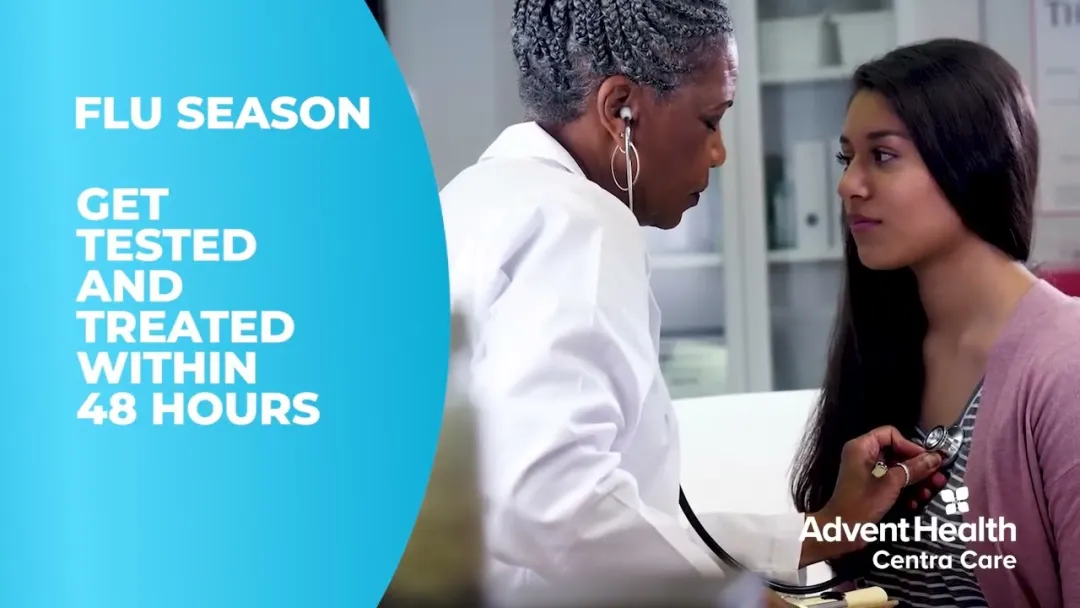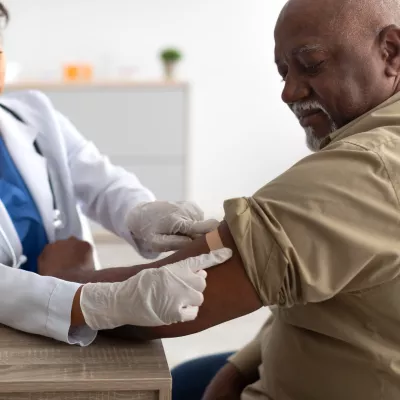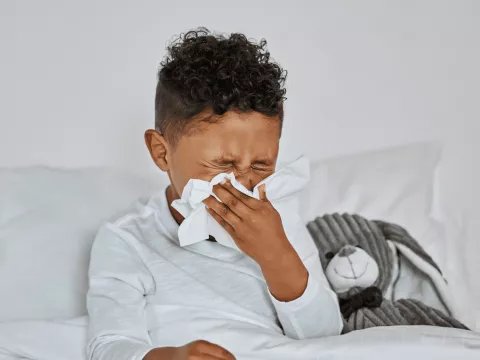Keep Your Family Well This Flu Season
As the saying goes, an ounce of prevention is worth a pound of cure. And when it comes to the flu, this couldn’t be truer. So, how do you keep yourself and your family safe this flu season?
Preventing illness from the flu isn’t a singular activity but requires multiple approaches, including:
- Vaccination: An annual flu shot is recommended as it prepares your immune system to encounter the virus
- Hygiene: Wash your hands with soap and water, use hand sanitizer when necessary and cover coughs and sneezes to help curtail the virus's spread
- Reduce transmission: Avoid close contact with sick individuals and stay home if you're unwell
- Practice healthy habits: Nutrition, exercise, adequate sleep and minimizing face-touching support your overall immune system
- Clean and disinfect: Regularly disinfect frequently touched surfaces and stay informed about flu activity in your community
Learn more about how to keep you and your family well this flu season.
Fight the Flu: Get Tested and Treated in One Visit
Whether it’s a cough, congestion, fever, sore throat or body aches, AdventHealth Centra Care is here for you. With flu test results available in just 15 minutes and treatments available onsite, we’ll get you and your loved ones tested and treated in one visit so you can feel better faster.
Flu Symptoms
It can be hard to know if your high fever and cough are due to the flu or another illness, like a cold or COVID-19. Here are the most common flu symptoms.
Common Symptoms
- Chills
- Dry Cough
- Fatigue (Sometimes)
- Fever
- Headache
Common Symptoms
- Nasal Congestion
- Runny Nose
- Sneezing
- Sore Throat
- Shortness of Breath
- Skin Rash/Discoloration
Occasional Symptoms
- Lost of Taste/Smell
- Nausea/Vomiting
- Diarrhea

Flu Symptoms in Kids
Flu symptoms can be different for children. Kids often experience nausea, vomiting, or stomach pain along with a fever, cough, and fatigue. Flu symptoms in children often come on much quicker than a cold. Symptoms to look for in your children include:
- Belly pain, nausea or vomiting
- Body aches
- Dry cough
- Extreme fatigue
- Headaches
- High-grade fever with chills

Find Flu Testing Near You
If you, your child or a loved one are experiencing flu symptoms such as cough, chills or fever, it’s important to get tested as soon as possible.
It can sometimes be difficult to tell the difference between the flu, the common cold, COVID-19 or seasonal allergies. Our urgent care clinics have rapid flu testing, which can tell you whether you have the flu or not within minutes. Flu treatments are most effective when taken within the first 48 hours of symptom onset, so getting tested and starting treatment early can help you feel better faster.
Convenient Flu Prevention and Treatment Services
Life is busy. That’s why at AdventHealth Centra Care, we make it easy to find care this flu season for your whole family with convenient hours, affordable costs and locations close to home.
-
Walk-Ins Welcome
We want to make it convenient to fit in wellness when and where you can, which is why you can walk into any of our AdventHealth Centra Care locations for flu shots, rapid testing or treatment. Or, if you’d prefer, make an online reservation. We’re here for you whenever you need us.
-
Onsite Flu Medications
Flu antiviral medication, like Tamiflu® (oseltamivir phosphate), can reduce the severity of symptoms and the duration of the flu. We make it easy to save yourself a trip to the pharmacy with $30 Tamiflu onsite at many locations. We also offer other common prescriptions and over-the-counter medications at most locations.
-
Immunizations
Prevention counts, especially with avoidable and seasonal illnesses. We offer flu shots for just $30 with no insurance required, as well as other immunizations to protect your health at work, school and while you travel.
Why Get a Flu Shot?
Getting a flu shot helps you avoid illness altogether or more serious illness if you do get sick. It’s also an effective way to reduce the spread of the virus and protect vulnerable family, friends and neighbors.
Avoid Complications
Most people who get the flu recover within two weeks. However, some may develop serious and life-threatening complications. The vaccine helps prevent these complications.
Protect Higher-Risk Groups
More vulnerable populations include older adults, pregnant people and those with compromised immune systems. Your flu vaccine protects them too.
Prevention Is the Best Medicine
Getting vaccinated, practicing good hygiene and maintaining healthy habits all year can minimize your flu risk.
A Typical Flu Recovery Timeline
Flu recovery varies from person to person, as it is largely dependent on individual health, flu prevention and any interventions such as antiviral medication. But the average person recovers from the flu in 10 to 14 days.
Remember, the best way to manage the flu is to prevent it in the first place by getting your flu shot and maintaining healthy hygiene and habits. But if you do catch the flu, give yourself the time and care you need to recover.
- Onset of Symptoms (Days 1 to 2)
-
People often comment that coming down with the flu feels like getting hit by a truck, as symptoms can begin abruptly. You might experience a sudden onset of fever, chills, body aches, fatigue, cough, sore throat and sometimes a runny or stuffy nose. These symptoms can make you feel lousy right from the start. This is the ideal time to seek flu treatment to reduce the effect and length of symptoms.
- Peak Flu Symptoms (Days 3 to 5)
-
Around day three, your symptoms might be at their worst. This is when fever, body aches and fatigue can be most intense. Coughing and congestion might also increase during this period.
- Gradual Symptom Improvement (Days 5 to 7)
-
After symptoms peak, you should start to notice a slow improvement. The fever may begin to subside, and your energy levels might slowly return. However, you might still experience a lingering cough and fatigue.
- Continued Recovery (Days 7 to 10)
-
By the end of the first week or so, most people see a significant improvement. Your energy levels should be getting back to normal, and the worst of the symptoms should be behind you. Cough and fatigue might persist, but they should be less intense.
- Complete Recovery (Days 10 to 14)
-
Around the second week, you should be on the road to a complete recovery. Most flu symptoms should have subsided by now, though some people might experience a lingering cough or fatigue for a bit longer.
We’re Here To Help You Feel Better, Faster
Flu Shots
Whether you’re looking to stay healthy for school, travel or work, we offer $30 flu shots (no insurance necessary) and other immunizations to get you on your way faster. Walk-ins are always welcome.
Flu Testing
If you’re feeling flu symptoms, it’s important to get tested as soon as possible. Early testing and treatment are key to a quicker recovery. Visit any of our urgent care locations for a rapid flu test.
Flu Treatment
If the flu’s got you down, treatment is most effective when taken within the first 48 hours of symptom onset. We’re here to help you get better, faster. If you have flu symptoms, make an online reservation or walk in for treatment.
Flu Tests and Treatments Near You
With more than 50 convenient locations, we’re making it easy to get the flu tests and treatments you need.
- Central Florida Flu Care Locations
-
Volusia
Seminole County
Flagler County
Orange County
- Apopka
- Azalea Park
- Colonial Town
- Conway
- Dr. Phillips
- Horizon West
- Lake Buena Vista
- Lake Nona
- Lee Road
- Ocoee
- Sand Lake
- South Orange
- University
- Waterford Lakes
- Winter Garden
- Winter Park
Osceola County
Lake County
Polk County
Brevard
- West Florida Flu Care Locations
- Kansas Flu Care Locations
- North Carolina Flu Care
Online Reservations for Flu Testing and Flu Shots
If you or a loved one are having flu symptoms or haven't yet gotten vaccinated, come in as soon as possible. If you can get treated and tested in the first two days of symptoms, you'll have the best chance of feeling better fast. Reserve an appointment online and get the convenient care you need.
Good Reads for Better Health During Flu Season
Explore our experts’ recommendations for how to keep yourself and your family safe all season long.










